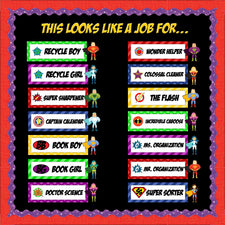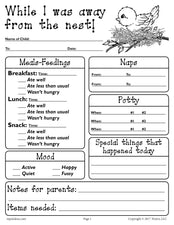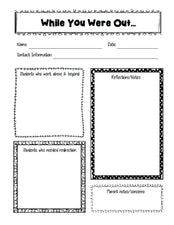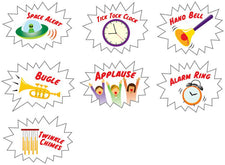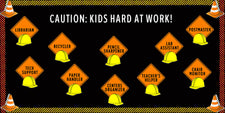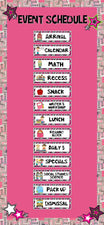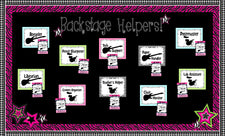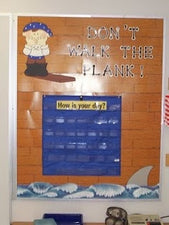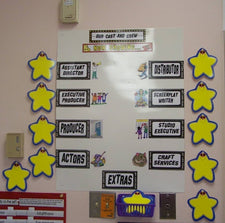50 Sample Teacher Interview Questions and Answers To Help You Land Your Dream Teaching Job!

Are you trying to become a teacher for the first time, or maybe shooting for a new position in a different school? If so, these fifty teacher interview answers and questions, along with tips for each, will help you prepare and ease any anxiety you have!
The broad range of example questions will provide you with helpful suggestions and reminders regardless of what type of teaching position you're looking for whether it be preschool, kindergarten, elementary, middle school, high school, PE teacher, art teacher, special education, etc.
1. Why do you want to become a teacher?
Sample Answer: I have always had a passion for teaching, and ever since I was a child, I've wanted to be a teacher. The gift of teaching allows me to be in a true helping profession. After all, the things that I teach the children in my class are the fundamentals that they will need to thrive as adults. There is no higher calling or more noble occupation in my eyes. All of my heroes have been teachers. And besides, I love kids. That’s important. You must love kids if you want to teach; there’s no two ways around that!
Tip: When asked this question, be honest. Chances are good that you really did decide to become a teacher in order to help others and make the world a better place. There’s no canned answer that can be used here, but in general, most teachers choose their career path because they love children and want to be in a helping profession. They definitely aren’t ‘in it’ for the money!
2. How would you describe your teaching philosophy?
Sample Answer: My teaching philosophy is simple. I use a hands-on technique and am approachable to my students. I incorporate fun into my lessons when possible. And while my easy-going style is suitable for many subjects and grades, I am also able to adapt my style to the needs of the student. For instance, if I have students that are not comfortable with independent learning, I employ the facilitator style of teaching that calls for a student-centered learning approach. My colleagues generally say that I am fun but tough, and I think their assessment is accurate.
Tip: The response to this question will vary from teacher to teacher. Be honest about your teaching style, but be sure to indicate that you are able to adopt a variety of different styles of teaching when they are suitable to a particular situation and to meet the needs of the students. This allows the interviewer to see that you are capable of handling a vast array of situations and students and that you have a range of different skills that you can draw from when needed. This makes you more appealing for a variety of different openings within the district.
3. How would you describe a successful lesson?
Sample Answer: A successful lesson is a lesson where my students are fully involved, listening and interacting with me and each other regarding the material presented. I plan my lessons to be thought-provoking and fun at the same time because I believe that students want to have fun and that they learn more effectively when learning is a pleasure, not a chore. I try to implement this concept into each lesson to the best of my abilities. The true measure of a good lesson, however, is when I can look at tests and quizzes on the material and see a good level of understanding and comprehension on the student’s part.
Tip: When answering this question, it is good if you can provide examples of successful lesson plans that you have taught, and that you take these examples and focus on how you determined them to be successful. Interviewers know that planning lessons is an integral part of teaching and they also know that teachers who are successful are great planners. Placing an emphasis on the fact that that you are continually analyzing the lessons that you present, looking for weaknesses and strengths, shows the interviewer that you are always open to improvements and that you are constantly working on further developing this skill.
4. What are some of your biggest weaknesses?
Sample Answer: I have found that one of my biggest weaknesses is time management. I have so many creative and educational activities planned that sometimes I try to get too much in during one class session. It sometimes becomes difficult to incorporate each activity into the lesson, although I know that my students will learn from them. Luckily, I have learned to prioritize my lessons so that I can bring only the material into the lesson that is most beneficial for the students, realizing that I simply cannot, within the time limits given, do everything that I would like to do with my students.
Tip: This is a great question to use to “sell” yourself to your interviewer, but you want to avoid giving the impression that you see yourself as a perfectionist. Interviewers are human, and they know that everyone has weaknesses. Your response to realizing a weakness and how you rectified that weakness is what the interviewer wants to hear. They don’t expect anyone to be free from weaknesses. You can also turn the perceived weakness into strengths, as the answer above suggests.
5. How would you describe your discipline philosophy?
Sample Answer: I believe that students must be held responsible and accountable for their actions, and that the ground rules and consequences for acceptable and non-acceptable behavior should be clearly established from the first day of school. My discipline philosophy is founded in the belief that proper discipline will not only facilitate learning but it will also improve relationships and the level of respect between students. Discipline can also help children to be more self-directed and realize a level of accountability in life that will serve them when they reach adulthood. Personally, I believe that negative behavior can be reduced or even eliminated if a teacher offers the student an environment that stimulates them and respects them. For very young children, I believe that the time-out system of discipline is effective because it not only ends the negative behavior by isolating the child into a time-out chair, it also gives the child time to reflect on their behavior without being summarily punished. Because time-out lasts for just a few minutes, the child is often able to correct his or her behavior and rejoin his classmates with a new attitude.
Tip: For reasons that are obvious, there is no cookie-cutter answer to this question. Your answer should be based on your style of teaching, the grade you will be teaching, and any past experience that you have with disciplining children. What the interviewer wants to see with this answer is that you do have a plan in place, and that you know the importance of discipline in the educational system. Provide a plan for action and back up your plan with clear examples. It can be helpful to learn all you can in regards to the discipline philosophy the particular school district follows and to tailor your answer to show your compliance with this philosophy.
6. What are your greatest strengths that you have to offer?
Sample Answer: My greatest strength is my ability to run an efficient classroom and to give individualized attention to each student. I am adept at identifying and maximizing the strengths of each student and learning their weaknesses so that I can better help each individual child excel to his or her potential. I am also patient, which is a trait that is a must-have for any educator. My patience allows me to work effectively with even the most challenging students.
Tip: When asking about your strengths, the interviewer is looking for you to be both positive and honest about where you feel your strengths lie. This is a time to brag about yourself and see yourself in the best light possible. It is necessary to play up your strengths when answering this question, but you don’t want to boast about too many of your strengths or you may seem deceptive – even if you are the ‘total’ package! In other words, don’t make yourself appear to be “too good to believe”.
7. Tell us a little bit about yourself.
This is not really a question, but your response is important. This is one of the most common interview questions and one of the most crucial. Keep in mind that even though the question is about you – the answer that most interviewers are looking for needs to give them a good idea about how you are a good fit for their school system. Keep this in mind when answering. So instead of saying “I’m a mother of three and married to a wonderful man”, you should highlight your greatest assets that you will be bringing to the table as a teacher.
(In fact, keep details of your personal life just that – personal – do not volunteer any personal information unless it is beneficial to the aims or goals of the school district). You can summarize achievements that you have made recently or in the past, you can make allusions to how your future plans fall in line with the goals of the school system and how you can contribute to the students that you will be teaching. Focus on the achievements that you have made that will make the biggest impression with the interviewer and that will make him or her feel as if you would bring something valuable to the table.
8. How would you deal with an angry parent?
Sample Answer: When dealing with an angry parent, I believe that it is important to remain calm and reasonable. It just doesn't do any good get all fired up and lose your temper. In my experience, I have found that by dealing with people in a rational and logical manner it helps to defuse the tension in the situation. I also think it is really important to always respect other people's points of views, regardless of what they are, and especially, when talking with a parent who is upset and angry. Parents are naturally sensitive when it comes to their children, so it is important to try to calm the parent down, listen to what they have to say, and talk with them through the issue, always keeping their point of view in mind.
Tip: When interviewing applicants, school districts are looking for teachers that are assertive and that are willing to stand up for what they believe in. Conflict in the classroom is never desirable, and schools want teachers who can get along well with other people. Yet, they realize that difficult situations and difficult people are likely to be encountered from time to time. A diplomatic candidate that can avoid being argumentative while respecting the other party is much sought-after.
9. What experience do you have working with children of this age?
Sample Answer: During my student teaching, I was assigned to a classroom that was made up of children of this age, and found them quite fascinating. I think this is the perfect age. Students of this age have an open mind and are more open to learning than older children. During my student teaching, I enjoyed planning and carrying out several lessons under the supervision of the lead teacher.
Tip: There is no right or wrong answer for this question. The answer to this question will be obviously based on the actual experience that you have, so be honest. In general, the interviewer is looking for applicants that are not necessarily experienced with children of all ages, but that are excited to work with the grade that they are interviewing for.
10. What about our school district intrigues you? Why do you want to work for us?
Tip: For this question, you must do a bit of legwork and research before the interview in order to tailor a custom response that will show the interviewer why you are interested in the particular school or school district, and what might have sparked this interest. If you have personal experience working with the district or school, you can include information about that.
For example, if you were hired as a substitute teacher for the district prior to getting your certification, then you could talk about that and how much you enjoyed your capacity as a substitute. You can also talk about different initiatives that the school has in place or is planning that interest you, or the extracurricular activities that the school offers that you find appealing. The interviewer in this case will be looking for something that validates why you want to work in their district.
11. What do you enjoy most about teaching?
Sample Answer: Why the children, of course! I believe all good teachers became interested in teaching because they love children. And I also believe you have to love children and enjoy being around children in order to love teaching. I enjoy helping to mold students into what they have the potential to become. I feel like teaching, being a helping profession, is more of a calling than a career choice. Teachers do truly have the power to change lives; I’ve experienced that myself firsthand through the teachers that have helped me over the years. Other than enjoying being around children and helping them to become well-rounded adults, the summers off aren’t that bad either!
Tip: This is the perfect answer for this question because it reinforced what may truly distinguish a great teacher from a good one – the love of children. Educating children is never an easy job, but it must be undertaken by someone who loves kids, and school districts know this. Showing that you love teaching, that it is not just a career to you, is a good way to get your foot in the door.
12. How would you encourage creativity in the classroom?
Sample Answer: I believe that encouraging the creation of ideas and allowing students to assemble their own ideas and thoughts is a good way to promote creativity within the classroom. I challenge my students to be free-thinkers and am always open to suggestions from them. Uniqueness and originality are rewarded. My classroom is one where freedom of expression is encouraged and honored and where the student is taught to analyze and think for themselves.
Tip: School districts are always looking for teachers who foster creativity within the classroom, so this answer is perfect. It is also a good idea to be able to provide examples of how you would help children to develop their creativity.
13. Do you consider yourself an empathetic person? If so, give an example.
Sample Answer: I do consider myself to be empathetic to many people and situations. Because of my upbringing, I believe I am able to appreciate some of the harder situations that we many times find ourselves in, and to show empathy and pity for others. For example, because we were not wealthy when I was a child, I am able to empathize with those students who cannot afford designer clothes and $100 sneakers. Because I don’t consider math to be one of my strongest subjects, I can empathize with those who struggle with math. I think empathy is important in a broad number of instances in our lives. It makes us more personable and more approachable.
Tip: School districts want to hire teachers who can be empathetic towards others, whether it is students, parents, or other teachers. Demonstrating your empathetic side shows them that you are a person who can relate to others. Nearly everyone has an empathetic side; if you don’t, you may be in the wrong field.
14. If a student hits another student or even you, what would you do?
Sample Answer: I would immediately try to de-escalate the situation and protect the children involved. If possible, I would restrain the child and ask for the principal or security official at the school to escort the child out of the classroom. If I have been assaulted, I would immediately report the incident and document the event. That type of behavior is absolutely not acceptable, and it needs to be dealt with quickly.
Tip: School districts typically have a plan in place for handling situations where a child hits another child or teacher. Nonetheless, districts want to see that teachers can think on their feet to deal with these instances of violence within the school. Like many other questions, this one also depends on the age of the students you are teaching. Obviously if a two year old hit you that's really not the same as a 10 year old slugging you or another student! But regardless of the age of the student discipline is necessary.
15. Where do you see yourself in five years?
Sample Answer: Teaching, of course! I have wanted to be a teacher all my life, since I was a child. I have never imagined doing anything else. In five years, I hope to have settled into the community and become a staple in your teacher’s lounge! I also hope that in five years I will have found my "niche" within this school system and community. I would really like to find where I can best be used outside of the classroom as well, whether it be as a coach or head of a club. No matter where I am, I hope to be doing what I love five years, ten years, even twenty years from now.
Tip: Interviewers want to hire teachers who plan to stick with it. The process of recruiting and hiring qualified teachers can be cumbersome on already over-burdened human resource offices. If they think you’re just looking for a job for a year or so until you move to another location, they may decide to go with someone else.
16. How would you handle a student swearing or using inappropriate language?
Sample Answer: Students who swear and use inappropriate language can be a challenge, and this type of behavior at school is never acceptable. I think that diffusing the situation without causing it to escalate further is important. In this instance, I would remain calm and avoid losing my temper. Because I am the authority figure in the room, it is important that I maintain order in order to make sure the other children feel safe. I would then escort the student to the office to see the principal regarding their language.
Tip: Maintaining order and control within the classroom is one of the biggest challenges facing teachers today. When interviewing for a teaching position, interviewers want to see that you have a plan in place to deal with possible scenarios like the one described in the question. They also want to know that you will be able to keep your cool and avoid losing your temper.
17. Would you consider yourself a risk taker? If so, what are some examples?
Sample Answer: I guess it really depends on what you consider a risk taker to be. If you think of a risk taker as someone who jumps out of airplanes and goes bungee jumping, then the answer is no, I am definitely not a risk taker! I was brought up to be a careful, cautious person who values my life and my family too much to take risks like that.
However, I am not the kind of person who is afraid of failure. I am willing to put myself out there and take risks to achieve the goal that I am after. I do not look at failure as a bad thing. Sure, it may be disappointing to fail at something, but I look at every failure as another experience in my life that I can learn from. And I think that attitude is the right attitude to have. You just can't go through life worrying about all of your failures, or worse yet, being so afraid to fail that you never take any risks.
Tip: While you may not think you need to be much of risk taker to be a teacher, it is important to be willing to put yourself out there a little bit. The only time we grow as people is by putting ourselves in situations we may not be all that comfortable with. Doing that, stretches us, and a lot of times shows us that we are capable of things we never even dreamed we could do.
So, I think it's important to note for this question that you don't have to be willing to sky dive or swim with sharks to be a risk taker. But if you are the kind of person that gets in their comfort zone and stays there at all costs, I would challenge you to look for situations where you can put yourself out there just a little bit!
18. Have you ever used differentiated instruction, and if so how?
Sample Answer: Yes, I have. Differentiated instruction can be wonderful for both gifted children and children who are struggling with a particular concept. For the gifted student, differentiated instruction allows them to be challenged by material that is at a higher level than their classmates. For the struggling student, allowing the student to revisit particular concepts allows them to catch up with their grade level.
Tip: Many schools and school districts are promoting the ideal of differentiated instruction because it allows for the student to work at their level rather than teaching from a perspective that all kids in a particular grade are actually on the same level. Showing that you understand the concept of differentiated instruction is valuable when interviewing in these districts.
19. What teaching methods do you use besides lecturing?
Sample Answer: I have found that there are a plethora of ways to teach other than simply lecturing. I love to do hands-on activities like experiments and crafts that help to reinforce a concept that I have lectured on. I also like to take my children on field trips, both real and virtual, in order to take a more in-depth look at the subjects that we are covering in a particular unit. Learning can be, and should be fun – and making it fun allows me to reach students in ways that I cannot by lecturing.
Tip: School districts are always looking for teachers who employ more than simple lectures when presenting lessons. This shows the talent of the teacher and that the teacher is willing to put in the extra work that is needed to motivate students to learn.
20. If I were to randomly walk into your classroom one day, what would I see going on?
Sample Answer: You would see children being challenged to do their best and a teacher that interacts with them on a level that they can understand. I believe in a lot of hands-on teaching, so you could expect to see me up at the Smart Board, demonstrating how to solve a problem or walking around the room, helping individual students. I believe in active, not passive teaching. I can accomplish very little in a seated position behind my desk! I want to get out there with my students, on the front lines, so that I can help each and every child to be the best they can be.
Tip: This answer gives the interviewer a glimpse into what your expectations are and how you would handle teaching on a day-to-day basis. The interviewer wants you to be able to envision yourself in the role of teacher and to relay what you see back to them.
21. In what ways do you prepare students for state and/or standardized tests?
Sample Answer: I find that using practice exams and sample questions throughout the year is a great way to prepare students to get ready for state or standardized testing. I try to implement questions that are similar to what the student will be answering on the test into my lessons whenever possible. To prepare the students for the writing requirement on standardized tests, I usually ask my children to write various pieces during the school year and then grade those pieces based on the criteria that will be used during state testing.
Tip: State testing and standardized testing is important to school districts because it not only measures the proficiency of students, but the results of these tests are also taken into consideration when federal money is disbursed to each district. Interviewers want to see that you are “on board” with prepping your students for testing all year long.
22. What are your classroom rules and how do you make sure your students know them?
Sample Answer: I am a staunch believer that ground rules must be laid down in the classroom from day one if I plan to maintain order and control in the classroom. I keep my rules simple and make sure that they are in a format that the student can understand. The rules aren’t lengthy – so as not to overwhelm the students or confuse them. I give each student two copies of my classroom rules on the first day of class; one he or she will sign and return to me, the other is for their reference.
The rules are – raise your hand when you need help – keep your hands to yourself – walk don’t run – treat others as you would have them treat you – follow directions. It’s that simple. These rules may seem simplistic, but they can cover a lot of incidences that might occur.
Tip: Keeping order is important, and school rules aren’t enough. Each teacher needs their own set of rules that govern their classrooms. It is important that you demonstrate that you understand this concept. Be sure to taper the rules to the grade you are teaching.
23. Describe your college experience(s)?
Sample Answer: Aside from taking the required classes to receive my teaching certification, I was also employed by the campus tutoring center where I worked with students who were struggling in various subjects, including algebra, calculus, and geometry. I think that gave me a great foundation when I began my student activities during my last semester.
Tip: Again, not a question, but a statement that is intended to prompt you for a response! While questions that require a “yes” or “no” answer may be easiest, it is this type of open-ended question that gives you the opportunity to give a thoughtful and intelligent response. This is your time to shine! And remember, being asked about the past is usually an attempt to predict future behavior. School districts ask you to describe your college experience so that you can highlight the achievements that you made, the organizations you were involved with, and the extra-curricular activities you participated in. Focus on the things that you did in college that make you a good fit for the position.
24. What methods do you use to handle classroom discipline?
Sample Answer: I think that the discipline that is handed out must match the child’s age and maturity level in order for the child to understand why he or she is being punished – and to make the punishment fit the offense. For example, disruptive third graders might receive a timeout or lose recess privileges for the first couple of offenses – and then future offenses might require a visit to the principal’s office. By developing ground rules and making those rules understood from the first day of class, my students will know what is acceptable and what is not. They will also know what disciplinary action will be taken if they don’t obey the rules.
Tip: Again, maintaining control while complying with school district’s policies regarding discipline is what he interviewer will be looking for when judging your response to this question. You may want to use an example of a real situation in which you have had to discipline a student tin order to show your expertise in this touchy area. Explain in your example why the discipline was appropriate and why it was effective.
25. What types of positive reinforcement do you use?
Sample Answer: There are various positive reinforcements that I use that can prompt a student to perform and to attend class. First of all, I think that the reinforcement should fit the task and the age of the student. For example, if I am teaching first grade, giving stars on a chart is a good reinforcement. But stars may not be a welcome reward for a fifth grader, who might be more willing to perform as expected for a reward like an extra recess or a homework pass. I also have used positive reinforcement of allowing a student to be class leader for a day, leading the class to lunch and bathroom breaks for the entire day for a job well done. For students who have perfect attendance for the grade period, a pizza party is a great positive reinforcement. I try to use a variety of positive reinforcements depending on the age of the children I'm teaching.
Tip: Interviewers want to see creativity in ways that you can motivate your class. By showing that you understand positive reinforcement and that you have plans of using it in your classroom, you demonstrate your effectiveness as a teacher.
26. How much experience do you have working with computers?
Sample Answer: I have lots of experience working with computers. During college, I actually took some online classes that helped me to further expand my knowledge of computers and the Internet. I am familiar with both Mac and Windows formats, and can easily navigate both operating systems. I also have extensive experience with Microsoft Office, including Word, Excel, and PowerPoint. I also maintain my own blog.
Tip: Today’s schools have evolved to the point that many things are done online or via computer. Many schools have digital lockers that allow students to complete their homework and turn it in online. To keep up, teachers must demonstrate a working knowledge of computers and cyberspace. If you are not that familiar with computers it definitely wouldn't hurt you to get a book or two, and maybe do some research online to learn how to better utilize technology in your classroom and get familiar with popular programs like Microsoft Office.
27. Are you a patient person? Give some examples of how you are or aren't patient.
Sample Answer: I believe that I am patient person to the point that it might even be considered a fault. We all have our own level of patience, and I believe that anyone who works with children must be patient. While I have little tolerance for misbehavior and will look to get to the root of the problem quickly, I find that I am more patient with other things, like waiting on a student to grasp a concept. Children can’t be rushed to learn; they learn at their own pace. If I want my students to be successful and to learn from me, I have to accept that they might not master a particular concept as fast as their peers – but that they still have the potential to do so, with my help. I am very patient with students as long as they are giving their best effort and they show a desire to learn and grasp the concepts being taught.
Tip: The ideal teacher has mounds of patience. Without it, they would quickly find themselves in a new career. In exhibiting patience, you are letting the interviewer know that you know what to expect and that you are prepared for it.
28. What do you use to measure student performance?
Sample Answer: I believe that it is important, both for the student and the school district, that teachers use standardized methods of measuring student performance. I mirror my student’s performance during the school year by formatting their tests, assignments, and so on, by the achievement testing that they will complete at year’s end. This gives students a heads-up on testing so that they are more comfortable and prepared for standardized tests each year. This is not only good for the student, but is also good for the district’s rankings.
Although most school districts have an established policy that teachers and educators must use to measure the performance of their students, some districts allow teachers to formulate their own guidelines. Since the amount of federal funding that public schools receive is based in part on their performance, showing that you want to promote higher performance levels on standardized testing makes you a more appealing candidate.
29. What are your goals in life?
Sample Answer: My goal is to spend my life teaching! I plan to pursue my M.A. on down the road. I don't see myself as one of those people who will change their career path five times before they finally find something they enjoy. And I'm definitely not someone who constantly has to change what I'm doing in order to stay interested in my job. I absolutely loved student teaching, and have always dreamed of being a teacher! On a personal level, I see myself at some point having a family and basically living the American Dream.
Tip: When hiring a teacher, school districts want to hire individuals that appear to be rooted to the community. This will increase the likelihood that the teacher will teach for many years. Having concrete and rational goals shows that you are this type of person and makes you appealing as a candidate!
30. What plans do you have for continuing your professional growth as a teacher?
Sample Answer: I plan to continue my education and pursue my master’s as soon as possible. Although I feel that I am adept for a career as an educator, taking additional training above and beyond what is necessitated will help me to be more effective.
Tip: This is the right answer. School districts want to see teachers continue their education, and they want to see teachers achieve rank. This shows your desire to better yourself and that you put a lot of stock in the educational process. If you aren't planning on getting your master's degree I would look into other programs that you can get involved in to continue learning and developing your skills as a teacher. It's not absolutely necessary, but it's something schools do look at.
31. How do you feel about team-teaching?
Sample Answer: I believe that team teaching can be advantageous in many ways. The biggest advantage of team teaching is that it fosters a supportive environment for the teacher that allows for the development and implantation of new teaching strategies while aiding teachers in feeling isolated. It can also increase the likelihood of a sound approach to dealing with problematic students while having other teachers nearby that you can use as a sounding board to be able to share both the joys and frustrations of individual class sessions. Further, when there is a collaboration of teachers in one classroom, it is simpler to come up with solutions for motivating and teaching students, as well as for establishing expectations for behavior.
Tip: Many school districts are going with a team-teaching/'team player' approach, so establishing that you can handle the pressures and unique challenges of the team-teaching method is a good way to show your versatility and flexibility for the district’s needs. Like any employer, the school district wants to hire teachers that have a “can do” attitude as opposed to an attitude of “I don’t do windows”. Being adaptable and accommodating will make you more approachable and valuable to school administrators, increasing the likelihood of being hired.
32. What would the ideal school look like to you?
Sample Answer: The ideal school would be a clean, safe, and well-maintained building that is filled with supplies, materials, and equipment that can foster a great learning environment. I have been in schools that appear to be crumbling to the ground, and I think that reflects on the students’ attitudes and their performance. A school that students can be proud of is one that they will want to come to each day. I would also say that the ideal school wouldn't have small classrooms with as many students packed into them as possible. I think it's important to keep classrooms well organized and to have a smaller number of students in each of them so their can be more one-on-one attention with the teacher if need be.
Tip: In asking this question, interviewers are looking for insight into what you think the school and surroundings should look like for students. Most districts pride themselves on the look of their schools, but many are left with little funding for school improvements. Interviewers want to see that you appreciate a well-maintained school building and grounds; this shows that you will work to keep it that way and encourage your students to do so, too.
33. As a student teacher what was the most frustrating thing you had to deal with?
Sample Answer: Although I loved the student teaching experience and I learned a lot from the teachers that I worked with, there were some frustrating moments. Some of the teachers that I worked with were very experienced and I found their teaching styles to be in conflict with my own style that I have adopted from training in college. For me, that was probably the toughest part of the whole experience. I never had any real trouble with any of my students.
Tip: It’s okay to admit frustration during the interview process. This positions you as a real person. Anyone who says that some aspect of the student teaching process was not frustrating was either very patient or a very good liar. No interviewer for any job will believe that you don’t have weaknesses and are immune from frustration. So while admitting your downfalls makes you human, you don’t want to focus on them.
34. How would you keep communication open between you and the parents of your students?
Sample Answer: I have always felt that communicating with parents is vital to the student’s success. At the beginning of each year, I make a point to talk to all parents, including those that don’t attend “open house”, whether I have to call them, email them, or reach out to them in some other way. I also send home frequent notes on how the student is performing and goals that are expected to be met. I have also thought about starting a class website with access to only students and parents so that the parent can see more of what the children are doing in the classroom. I also make sure that parents know how to contact me during my planning period in the event that they need or want to discuss something with me. If parents aren’t encouraged to participate in educating their child, the child suffers as a result, which is why the inclusion of the parents is so important to me.
Tip: School districts crave parent involvement, which is why they would love this answer. Teachers that encourage parents to communicate with them are becoming a commodity, and parents are participating less and less in their child’s education. Districts want to see teachers making an extra effort to get parents involved.
35. What questions do you have for us?
Sample Answer: I would like to integrate computer technology into my classroom – do you have the resources for doing so in this school? What opportunities for professional development are available? Are the parents at this school fairly active in classroom participation? What is the next step in the process of being hired? When will I know if I am hired?
Tip: It is important that you always ask three to four questions at this point, but be careful not to ask more than that as you may overwhelm your interviewer. Ask only those questions that you cannot get by researching the question on your own. You may even want to consider writing down the questions that you want to ask on an index card and bringing it along on the interview.
36. Do you agree or disagree that you should demand respect?
Sample Answer: I do believe that teachers should be respected, and that they must demand respect from their students, but demand it in a respectful way. Now, more than ever, students are not taught respect at home, and school remains their only outlet for receiving instruction and guidance in how to be respectful. If we as teachers do not require that students respect us, some students may never learn to be respectful at all. Respect is also essential to maintaining control in the classroom. If students don’t respect you or their fellow students, they certainly won’t feel compelled to behave or follow directions, or even hand in their homework. Showing respect to every student and getting respect back from them is definitely important in every classroom.
Tip: Most school districts believe that teachers should be respected, and they realize that a good teacher who is in control of their classroom and their students will demand respect. Districts don’t want to hire teachers to “be friends with” students. They want to hire teachers who can help to mold the student into a successful and productive adult.
37. What do you dislike about teaching?
Sample Answer: One thing that discourages me about teaching is the lack of funding in the public school system. There are so many things that teachers need to purchase that have to come out of their own pocket, and there never seems to be enough money to buy everything.
With that being said, I also understand the fact that money doesn't just grow on trees! When things get tough, schools need to cut back just like everyone else, and they need to find ways to be more efficient. I don't know what the solution to the problem is, but it would be great if schools could do something to increase their revenues in order to purchase supplies for their teachers.
Tip: Good answer. Although you should never go into an entire list of things that you don’t like about teaching, it is never good to point out more than a thing or two or you risk looking as if you don’t really like your job at all! Selecting something like lack of funding is a safe choice when it comes to things that you don’t like as it is universally “not liked” by teachers and school districts alike.
38. Would you say you make learning fun, and if so how?
Sample Answer: Yes, I do. I firmly believe that students learn more freely when they are having fun instead of doing a chore. By making learning fun, I am able to reach a greater number of students than if I have a serious and stern attitude. My students are able to see me as a peer, which helps to facilitate the relationship between teacher and student.
I incorporate fun into the classroom in a variety of ways. In the past, I have used art projects, plays and skits, films, and other media as a way to be hands-on with the students to drive home skills, while having a good time in the process.
Tip: Most educators recognize the fact that children are more open to learning when they are having fun at the same time. The ability to bring fun to a lesson while keeping it effective is a sought after skill!
39. Have you ever been responsible for taking care of someone? Did you enjoy it?
Sample Answer: In my role as student teacher, I was often left in charge of the classroom and students. I enjoy being in a supervisory position and working with children. I think that my leadership skills make me a natural caretaker, and I very much enjoy being in charge.
I am now also responsible for taking care of my mother. She is getting older and without my dad around anymore she needs help with pretty much everything. It's definitely been challenging, but I really do enjoy being able to care for her and spend that extra time together.
Tip: School districts and interviewers are looking for teaching candidates that have a “take charge” attitude. Likewise, they want to see that you are comfortable taking responsibility for others. And while teaching is more than “glorified babysitting”, being able to take care of your students and supervise them appropriately is a necessity, and ideally, you should enjoy doing just that.
40. How much homework will you assign?
Sample Answer: I try to keep homework to a minimum as much as possible, and I don’t ever overwhelm my students with hours of homework. For students to be well-rounded, they need to have time after school for family, friends, hobbies, sports, and more. There are times, however, when it is necessary to assign more homework in order to practice a concept.
For example, if I am teaching long division to my students, I may ask that they complete thirty problems each afternoon in order to practice and become proficient in this important mathematical skill. I try to taper larger homework assignments so that I don’t give two long assignments in one afternoon. Homework, in moderation, is important.
Tip: Good answer. More and more school districts are realizing that over-burdening a child with homework is not only a stressor on the child, but it can also cause them to stay up late and not get a sufficient amount of sleep. This can impact the child’s health, school performance and more.
41. If one of your students told you that you were the worst teacher they have ever had, how would you respond?
Sample Answer: Being insulted is never fun, and that would definitely “sting”. I believe that I would counter their insult by letting the student know that I’m sorry they feel that way, and that I am doing my best to live up to their expectations. I think that dealing with a situation like that would need to be on a case-by-case basis and that my response to the student would be tempered by the type of relationship that I had with the student and the time and place that the comment was made. I believe that remaining in control and not losing my temper is the most important thing in instances like this.
Tip: School districts want to see that a teacher is able to handle unruly or rude students, as these types of students are found in every modern classroom. The interviewer wants to see above all that you can remain calm and in control in the face of adversity. This is important for maintaining control of the classroom.
42. If a student kept complaining about an assignment you gave, how would you handle it?
Sample Answer: In a situation of this type, I would find out if the student needs extra help or further clarification on how to do the assignment. I would encourage the student to complete the assignment, and if necessary, explain to the student why the assignment is important to the unit being presented or the concept that they need to master. Students will complain about work that they have to do from time to time, but this is a trait that everyone shares, both young and old. Following through and requiring the student to complete the assignment, with help if needed, will help to instill responsibility in the student.
Tip: This is a great answer to this question because school districts and interviewers want to hire teachers who not only plan their lessons well, but who expect students to perform no matter the case. This shows control of the classroom and effective teaching skills.
43. If one of your students wasn't completing their work, how would you handle it?
Sample Answer: Motivation is a big part of teaching, and motivating students who do not complete their work is an integral part to helping the student achieve success. To address this situation, I would confer with the child to find out if there is a barrier to completing the work that I can help with. If they don’t understand the concept, my job is to help them understand. If there is some other personal barrier that needs to be addressed, I can point the child towards the help that they need by consulting with the guidance counselor or other official. The important thing is to get the child on the right track and to overcome the obstacle that they are facing.
Tip: School districts and interviewers want to see that a teacher is willing to work with students who may be falling behind. The school district’s success and funding are dependent upon student progress and performance. By going the extra mile to work with struggling children, teachers are doing their part to help the entire district succeed.
44. Do you typically have a positive outlook on things? If so, give some examples.
Sample Answer: I definitely have a positive attitude when it comes to most things. I have always found that a positive attitude is very contagious, and inversely, so is a negative attitude. I believe that staying positive is important in the classroom. It facilitates the learning process and helps you to develop a great relationship with your students and fellow teachers. I have never achieved anything with a negative attitude. I prefer a ‘can-do’, positive, and upbeat atmosphere in the classroom, both for learning and teaching. Positive teachers yield positive students – and positive students are effective learners.
Tip: Obviously, school districts want teachers with positive attitudes. And really, when you think about it, what interviewer doesn't want someone with a positive attitude? I don't think I've ever been in an interview where they asked, "Do you generally have a positive attitude and outlook on things?" and you answer with an enthusiastic, "YES!" only to hear them say, "Well... I guess you're not really what we're looking for then. We were hoping to find someone that could be a real downer. You know, someone that could consistently bring down those happy, positive people who are always looking at the bright side of things."
Obviously, that was just a joke, but you get the point that having a positive attitude is favorably looked upon. By portraying a positive attitude, you will be seen as having the ability to better and more effectively do your job. Positive teachers are more successful and are a hot commodity!
45. How would you handle a child who causes distractions and problems, but seems very gifted?
Sample Answer: I think that when a child causes distractions and problems that they are doing what they can to attract attention, and there’s a reason for that. There is something going on with the child that needs to be addressed. I would pull the child aside and have a talk with them to see if there is an issue that can be resolved with my help. I would also make it a point to give the child some extra attention, and to point out their strong suits and encourage them with positive feedback. Sometimes misbehavior is nothing more than a cry for help. As teachers, it is important that we recognize this.
If students are simply bored with class because they "get it" and it shows in their grades, then I may give them some additional things they can work on to challenge them. I think it's important to continually challenge students. No matter what age group you teach, there are always going to be some students ahead of others in terms of learning the material. Rather than just give them free rain, I think it's beneficial to both them and the other students to give them additional assignments.
Tip: Handling children who are troubled or who are simply disrupting class because they are bored, is a big part of any teacher’s job and it is certainly a challenging undertaking. When hiring a teacher, interviewers want to know how a teacher would handle such children because these issues arise all the time. By showing empathy and concern for the child, you demonstrate your willingness to involve yourself on a deeper level with your students, which means that you’ll likely be an effective and caring teacher.
46. Would you be interested in getting involved in after school activities? If so, which ones?
Sample Answer: Yes, absolutely. I have lots of skills that can be applied to after school and extracurricular activities for the students at this school. From coaching or helping to coach the academic team to sponsoring the cheerleading squad, I would love to get involved wherever I am needed. I believe that being involved with students beyond the three o’clock bell is important for establishing rapport and trust, and besides, it is so much fun!
Tip: School districts are always on the lookout for those teachers who are willing to give more of themselves than what their paychecks provide. Coaches, sponsors, leaders – they’re all needed and in vast numbers. It is also a good idea to be willing to attend school events, like ball games or track meets. This shows that you support the school.
It's important to note that while getting involved in extracurricular activities is often favorably looked upon, it is not necessary to get the job. If you are the kind of person that just wants to get your feet wet and get used to the whole teaching thing before deciding if you can take on more responsibilities, that is perfectly fine. As always, it's best to just be honest.
47. If you've heard students constantly complaining about another teacher what do you do?
Sample Answer: I would ignore it! I realize that not all teachers are going to be popular with their students, and it is not my job to intervene or to question someone else’s teaching style as long as it doesn’t interfere with the health or well-being of my students. I think that teachers must respect one another in that regard, and while advice should be doled out when asked for, it is not proper to question another teacher’s abilities or skills as a teacher.
Tip: Bingo. Nothing is more disparaging to school districts than conflict between teachers and they have far bigger issues to deal with. By showing that you’re willing to be a vigilant watchdog for your students while at the same time tempering your watchfulness with minding your own business is a good thing. School districts don’t want to hire individuals for any position if they feel that the individual will overstep their boundaries. In short, school districts don’t need teachers to police one another.
48. If we sat down right now and discussed goals for the upcoming year, what would they be?
Sample Answer: My biggest goals for the year are to prepare my students to meet their core competencies by the end of the year. I believe that every teacher should set a goal of recognizing where individual students are struggling and then finding a way to get each student up to speed with where they need to be. I also believe that students should demonstrate the ability to perform at grade level before going on to the next grade. It is my intent to have all my students reach their goals before being promoted to the next level in school. I also want to make sure that my students are in school and ready to learn every day, and have plans of implementing an attendance incentive to encourage them to come to school.
Tip: All school districts have goals that must be met in order to qualify for federal funding dollars. School districts and interviewers want to see that you are on board with their goals, and under the No Child Left Behind Act, those goals are similar. Each child should be able to demonstrate the core competencies for their grade level. If they don’t, schools lose money.
49. Obviously, don't name any names, but who has been your most challenging student and why?
Sample Answer: The most challenging student to me is a student who won’t listen, which is often the case with students who suffer from ADHD. I had a little boy in class once who had ADHD that was somewhat controlled by medication. He was very inattentive and would often stare into space while his classmates were busy doing worksheets or reading. I felt almost powerless to help him while dealing with twenty other children at the same time. I had to dedicate specific time to this student each day in order to help him catch up with his peers. He didn't really disrupt class or anything, I just found it very challenging to give him the attention that he needed while still helping other students.
Tip: Interviewers know that you’re not Mary Poppins, and admitting weaknesses and challenges shows your honesty and integrity. All teachers are presented with challenging students, but not all will admit that they had a struggle on their hands. By showing that you found the student to be a challenge, and then discussing how you handled it, you show yourself as an intuitive and effective teacher.
50. If one of your students told you that none of the other students liked them, what would you say?
Sample Answer: I would say, “That can be really tough, but did you know that everyone feels as if they don’t fit in at some point in their lives, even adults, including me. And there are other kids in this very classroom who are going through the same thing. I know it feels like the end of the world, but this feeling won't last forever. If you ever need to talk, I’m here for you.” I think that as a teacher, the role that can be taken is to coach and reassure the child. Children who feel like they don’t fit in feel unsafe and vulnerable, and they are often prone to teasing or bullying. I would make a special effort to include the child in group activities with other students, and to foster group activities whenever possible, fitting the activity to the grade level.
Even the act of positioning the children’s desks so as to encourage interaction between a group of girls or a group of boys can help a child to fit in. There are lots of ways a teacher can promote friendship among students.
Tip: When hiring an effective teacher, interviewers are looking for teachers who can handle and overcome this all-too-common problem. Showing that you have thought about this potential issue positions you as a nurturing and caring educator!
BONUS: Even More Common Teacher Interview Questions To Prepare You For Your Teaching Interview
51. How will you handle students with disabilities / special needs students?
52. Do you consider yourself to be a 'team player'?
53. What is your teaching mission statement?
54. How do you stay up to date on the latest trends in education?
55. What is your least favorite subject to teach and why?
56. How would you describe your classroom management philosophy?
